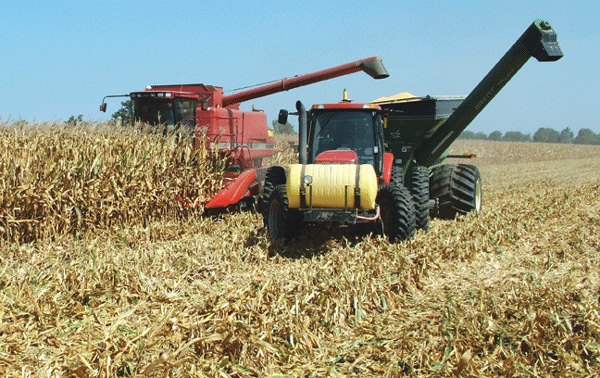
Much of what causes machinery fires are overheated bearings and belts, exhaust components, clutches and brakes, electrical malfunctions and sparks caused by damaged or improperly adjusted components, and foreign material entering the processing path. Drive components clogged with crop material also can get hot enough to catch fire.
September 22, 2010

Farmers can greatly reduce the risk of starting field fires with proper, regular maintenance of combines and other equipment used to harvest crops, according to a Purdue Extension farm safety expert.
Combines are especially vulnerable to fires, because of the many hours they operate at a time and the dry crop fodder that can collect on them, Gail Deboy said.
"During hot, dry weather, very dry fodder provides an excellent source to fuel a flame whenever a fire is ignited," he said.
Combine fires can easily spread to crops or remaining corn stover, rapidly igniting acres of farmland. Field fires can spread to nearby farm equipment, trees and buildings, including homes. Smoke from fires can create health problems for nearby residents and reduce visibility on roads.
Much of what causes machinery fires are overheated bearings and belts, exhaust components, clutches and brakes, electrical malfunctions and sparks caused by damaged or improperly adjusted components, and foreign material entering the processing path. Drive components clogged with crop material also can get hot enough to catch fire.
"As combines have become larger, they carry much larger quantities of fuel, lubricants and hydraulic oil," Deboy said. "Even small leaks in any of the systems using flammable liquids can result in a large fire in seconds."
Deboy suggested the following ways farmers can minimize the potential for combine and field fires and better react in the event of a fire:
• Perform regular maintenance on machinery. Keep combines clean, free of crop residue, and free of fuel and oil leaks. Regular inspection and maintenance of bearings, seals, potential crop wrap points and exhaust systems minimizes possible ignition points. Service equipment at the end of the day, rather than at the beginning, to detect overheating components or smoldering material that could burst into flames overnight.
• Maintain the electrical system. Keep a close eye on components that draw heavy electrical loads, such as starter motors, remote actuators, and heating and cooling systems. Consider fuses that blow regularly a warning sign that a circuit is overheating.
• Install portable fire extinguishers on every large piece of machinery. Extinguishers should be approved for fire types A, B and C and be of suitable size for the potential fires that could occur. They also should be inspected and serviced regularly.
• Keep a cell phone handy. Small field or machinery fires can be contained if emergency personnel can respond quickly.
"Be removing any one of those elements, a fire is prevented," he said. "As farmers examine combines or other agricultural machinery, they should consider the potential for each of those elements and where they are likely to come together to form a fire."
More information on preventing combine fires is available from the Centers for Disease Control and Prevention's National Ag Safety Database at http://www.nasdonline.org/
You May Also Like



